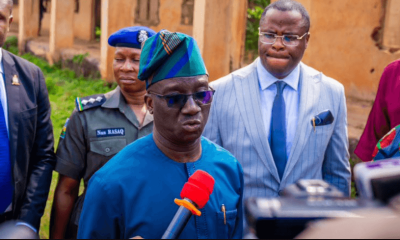Education
Bullying In Nigerian Schools, Effects, Prevention

12-year-old, Sylvester Oromoni, a Junior Secondary School 2 (JSS) student of Dowen College, in the Lekki axis of Lagos State, tragically died under controversial circumstances leading to a public outcry. The late Dowen student was reportedly said to have been bullied by the boys in his school who were quite older than him.
This came some months after an aggrieved mother, Mrs Deborah Okezie Archibong, the mother of an 11-year-old student in a private school in Uyo, posted a video on social media, where she cried out that her son’s seniors were sexually molesting him. Deborah alleged that her son, John Davies, was continuously tormented, demoralised by his older classmates in a faith-based school.
Mercy Johnson Okojie, a popular Nollywood actress, also recently cried out that a teacher in her daughter’s school was bullying her because of her celebrity status. The mother of four revealed that her first daughter, Purity, was bullied by a teacher in her school because of her hatred for her mother. An investigation was launched into the case which led to a resolution.
From the above narrations, it is safe to admit children, for all their innocence and inexperience of the world, can be vicious bullies. Their actions, which is hindered by the social norms we learn in later life, can be merciless, violent and shocking.
And like a menace, bullying has now become very prevalent in most secondary schools across Nigeria which have led to not just the death of students, but also left a lifelong scar and implications in the development of the victims.
However, due to compliance in Nigerian schools, bullying has gone on for decades and has now been seen as an acceptable culture that students are expected to adapt to.
It is a sad reality that the Nigerian school, a supposed safe haven and learning hub, which should seek the overall development and growth of a child has become a breeding ground for child violence, antisocial behaviours and in worst cases, child death.
The definition of bullying that academic researchers have adopted states that it’s any form of aggression in which 1 or more children known as the perpetrator harm or disturb another child known as the victim who is perceived as being unable to defend himself or herself.
Typically, a power imbalance exists between the perpetrator and the victim, with the perpetrator being either physically or psychologically more powerful.
When asked why children choose to become bullies? an experienced secondary school teacher in Lagos named Akin told Naija News that” bullies want to be the leader of the group and in charge,” which most often leads them to pull down other children “And the way they achieve that is to push kids down to be in control.”
Family background is said to also play an integral role in influencing a child’s behavior. Parents should note that their actions may be influencing their child. “For some parents, their interpersonal style may be modelling that behavior,” he concluded.
Bullying in school could come in physical, verbal, sexual, and prejudicial forms putting its victims at risk of developing behavioural difficulties, physical health problems and suicidal ideation and like dark clouds, these effects hovers around the victim for the longest time, until they seek help to heal, this is for some, but for others, it is not same.
No doubt the effects of bullying can be grievous and long-lasting for victims. A survivor who pleaded anonymity, told Naija News about traumatic experiences she underwent such as being forced to witness an abortion carried out by a senior student and being body-shamed for her looks, which left her struggling with self-esteem for a long time. Other demoralizing effects includes; Fear
Depression
Loneliness
Anxiety
Physical illness
Suicidal thoughts,
and most times, death.
However, one way to prevent bullying in school is for parents to start from home to instill the right values into their children. This will be done right if they live exemplary lives in which the kids emulate through influencing.
Another way to address school bullying could be a buddy system designed to foster peer support, this is where younger students are assigned an older mentee (a senior) to show them the ropes when they start school and how to get by.
A supportive school environment, in general, is also important when it comes to tackling and preventing bullying. This will take a lot of persistence, and consistency from the teachers and the school staff in general.












